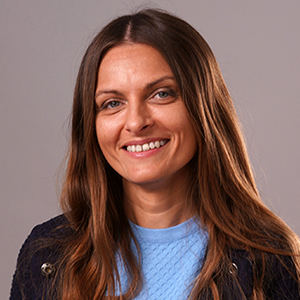Sanja Brdar

Position:Head of the Center for Information Technologies
Academic Rank: Senior Research Associate
Sanja Brdar is a senior researcher and head of the Centre for Information Technologies at BioSense Institute. She received a PhD degree from the University of Novi Sad in 2016. Prior to starting her PhD studies, she spent two years working in the software industry with a major in databases design and development. In 2010 she was awarded a ten-month Basileus fellowship for joining the Bioinformatics Laboratory at University of Ljubljana which set the foundations for the PhD thesis on data/knowledge fusion in bioinformatics. Currently, she is actively involved in many projects including H2020 Antares, Dragon, Bestmap and Flexigrobots and teaches two master level courses at Faculty of Sciences. Her research interests include machine learning, explainable AI and bioinformatics. She works on ensemble methods, data fusion, clustering, and predictive modelling with applications in biology, agriculture, environmental sciences and health. She enjoys participating in worldwide data science challenges and with the team of researchers made significant results: placed third in Nokia Mobile Data Challenge (2012), finalist of Orange, France, Data for Development Challenge (2013), finalist/winner/third place of Syngenta Crop Challenge (2016, 2017, 2019) and finalist of UNDP Depopulation challenge (2020).
Center:
CIT
Themes:
1. AgroSense
2. Government
3. Bioinformatics
4. Machine Learning
5. Artifical Intelegence
Projects:
Publications:
- Mimić, G., Brdar, S., Brkić, M., Panić, M., Marko, O., & Crnojević, V. (2020). Engineering Meteorological features to Select Stress tolerant Hybrids in Maize. Scientific reports, 10(1), 1-10.
- Lugonja, P., Brdar, S., Simović, I., Mimić, G., Palamarchuk, Y., Sofiev, M., Šikoparija, B. (2019). Integration of in situ and satellite data for top-down mapping of Ambrosia infection level, Remote Sensing of Environment, vol. 235, 111455.
- Marko, O., Brdar, S., Panić, M., Šašić, I., Despotović, D., Knežević, M., & Crnojević, V. (2017). Portfolio optimization for seed selection in diverse weather scenarios. PloS one, 12(9), e0184198. IF 2.766
- Brdar, S., Gavrić, K., Ćulibrk, D., & Crnojević, V. (2016). Unveiling spatial epidemiology of HIV with mobile phone data. Scientific reports, 6(1), 1-13.
- Brdar, S., Crnojević V., Zupan, B. (2015). Integrative clustering by non-negative matrix factorization can reveal coherent functional groups from gene profile data, IEEE Journal of Biomedical and Health Informatics, doi: 10.1109/JBHI.2014.2316508 IF 2.093
Patent:
- A method for early prediction of wheat yield based on artificial intelligence
- System and method for intelligent soil sampling
- Universal system and method for automatic classification of pollen particle types in air in real time